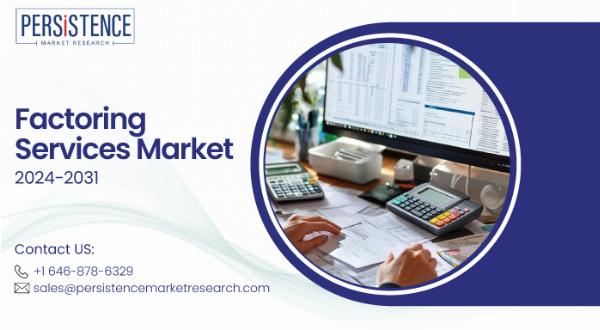what are debt factoring services

Strong 8k brings an ultra-HD IPTV experience to your living room and your pocket.
Debt factoring services, also known simply as factoring, are financial solutions that allow businesses to sell their unpaid invoices (accounts receivable) to a third-party company, called a factoring company or factor, in exchange for immediate cash. This process helps businesses manage cash flow, reduce the financial strain caused by slow-paying customers, and focus on growth without waiting for invoice payments.
In this blog post, we’ll break down what debt factoring services are, how they work, their advantages, and why they are beneficial for businesses facing cash flow challenges.
Read More: https://www.persistencemarketresearch.com/market-research/factoring-services-market.asp
What Are Debt Factoring Services?
Debt factoring services involve selling a company’s outstanding invoices (debt) to a factoring company at a discounted rate. The factoring company advances a percentage of the invoice value—usually between 70-95%—to the business immediately. The factor then takes over responsibility for collecting payment from the customers. Once the invoice is paid, the factoring company releases the remaining balance to the business, minus a factoring fee.
This process provides businesses with instant working capital while outsourcing the task of collecting from customers.
How Debt Factoring Works
The debt factoring process is relatively simple and involves the following steps:
Invoice Generation: A business provides goods or services to its customers and issues invoices with payment terms, typically 30, 60, or 90 days.
Submit Invoices to a Factoring Company: Instead of waiting for the customer to pay, the business submits these unpaid invoices to a factoring company.
Receive Advance Payment: The factoring company evaluates the creditworthiness of the business’s customers and, upon approval, advances a percentage of the invoice value—usually 70-95%—to the business within 24-48 hours.
Collections by the Factoring Company: The factoring company takes over responsibility for collecting payment from the customers, allowing the business to focus on its core operations.
Final Payment: Once the customer pays the invoice in full, the factoring company releases the remaining balance (known as the reserve) to the business, minus a factoring fee. This fee typically ranges from 1-5% of the invoice value, depending on the agreement and the credit risk of the customers.
Types of Debt Factoring
There are different types of debt factoring arrangements depending on the business’s needs and risk tolerance. The two most common types are:
1. Recourse Factoring
In recourse factoring, the business is responsible if the customer fails to pay the invoice. If the customer defaults or delays payment beyond a certain period, the business must either repurchase the unpaid invoice or repay the advance to the factoring company.
Best for: Businesses with creditworthy customers who consistently pay on time.
Advantage: Lower factoring fees since the factoring company assumes less risk.
2. Non-Recourse Factoring
In non-recourse factoring, the factoring company assumes the risk of non-payment if the customer becomes insolvent or defaults. This type of factoring provides more protection for the business, but it typically comes with higher fees since the factoring company takes on more risk.
Best for: Businesses concerned about customer insolvency or those dealing with high-risk customers.
Advantage: Provides protection from bad debt.
Advantages of Debt Factoring Services
Debt factoring offers several advantages, particularly for businesses that struggle with cash flow or need immediate working capital. Here are some of the top benefits:
1. Immediate Access to Cash
One of the main advantages of debt factoring is immediate access to working capital. Businesses no longer need to wait 30, 60, or 90 days for customers to pay their invoices. Instead, they can receive cash within 24-48 hours of submitting the invoices to the factoring company. This quick access to funds allows businesses to cover expenses like payroll, rent, inventory, and other operational costs.
2. No Additional Debt
Unlike traditional loans, debt factoring is not considered debt. When businesses factor their invoices, they are selling their receivables, not borrowing money. This means there are no monthly repayments, interest charges, or impact on the business’s credit score.
3. Outsourced Collections
Factoring companies take over the responsibility of collecting payments from customers, allowing businesses to focus on their operations rather than chasing down overdue payments. This is especially useful for small businesses that don’t have a dedicated credit control or collections department.
4. Flexible Financing
Factoring is a scalable financing option that grows with the business. As the business generates more sales and invoices, it can factor more of its receivables and access more working capital. This makes factoring an ideal solution for businesses experiencing rapid growth or seasonal fluctuations in cash flow.
5. Improved Cash Flow Predictability
By factoring invoices, businesses can gain more predictable cash flow, which helps with financial planning and budgeting. With immediate access to funds, businesses can better manage their operations, invest in growth, and reduce the risk of cash flow shortages.
Disadvantages of Debt Factoring Services
While debt factoring offers many advantages, it also has potential drawbacks that businesses should consider before using this financing option.
1. Cost
The main drawback of factoring is the cost. Factoring companies charge a fee—typically between 1-5% of the invoice value—which reduces the overall profit margin on each sale. For businesses with thin profit margins, these fees can add up, particularly if they factor a large number of invoices.
2. Loss of Control Over Collections
When a business factors its invoices, it transfers control of the collections process to the factoring company. Some businesses may be concerned that the factoring company’s collection methods could negatively impact customer relationships, especially if customers prefer to deal directly with the business.
3. Customer Perception
Some customers may view factoring as a sign that the business is struggling with cash flow. While factoring is a common and legitimate financing option, businesses should manage how the arrangement is communicated to customers to ensure it doesn’t damage customer relationships.
4. Eligibility Requirements
Factoring companies typically focus on the creditworthiness of the business’s customers, rather than the business itself. If the business’s customers have poor credit or a history of late payments, the factoring company may reject the invoices or charge higher fees.
Who Can Benefit from Debt Factoring?
Debt factoring is particularly beneficial for businesses that:
Operate in industries with long payment terms, such as manufacturing, transportation, and construction.
Experience cash flow gaps due to delayed payments from customers.
Need immediate working capital to cover operational expenses, payroll, or expansion.
Have creditworthy customers but struggle with collecting payments on time.
Key Considerations When Choosing a Factoring Company
When choosing a factoring company, it’s important to consider several factors to ensure you find the right partner for your business:
Advance Rates and Fees: Look for a factoring company that offers competitive advance rates (typically 70-95% of the invoice value) and reasonable fees (between 1-5%). Be sure to understand the fee structure, including any hidden fees like administrative or early termination charges.
Recourse vs. Non-Recourse: Decide whether your business prefers recourse factoring (lower fees, but you’re responsible for unpaid invoices) or non-recourse factoring (higher fees, but the factoring company assumes the risk of non-payment).
Customer Service: Choose a factoring company with a reputation for excellent customer service. A good factoring partner will be responsive, transparent, and easy to work with, especially when it comes to handling collections.
Industry Experience: Some factoring companies specialize in certain industries (such as trucking or manufacturing), which can be advantageous if they have expertise in your field.
Contract Flexibility: Look for factoring companies that offer flexible contracts, such as spot factoring (factoring individual invoices as needed) or short-term agreements, rather than long-term contracts that lock you into factoring all of your receivables.
Conclusion
Debt factoring services provide businesses with an effective solution for managing cash flow by converting unpaid invoices into immediate working capital. For businesses dealing with slow-paying customers, long payment cycles, or seasonal cash flow fluctuations, factoring offers a fast and flexible way to access funds without taking on debt.
While factoring has its costs and potential drawbacks, the benefits—such as immediate liquidity, no added debt, and outsourced collections—make it an attractive option for many businesses. By understanding the different types of factoring and selecting the right factoring partner, businesses can improve cash flow, maintain financial stability, and focus on growth.
Note: IndiBlogHub features both user-submitted and editorial content. We do not verify third-party contributions. Read our Disclaimer and Privacy Policyfor details.







